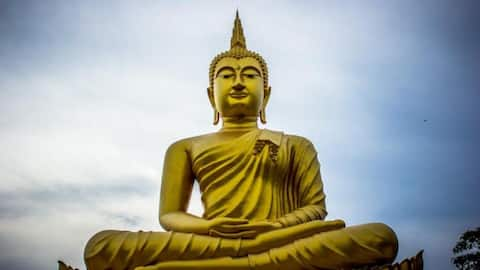Buddha Purnima 2024: A global celebration of enlightenment
What's the story
Buddha Purnima, also known as Vesak or Buddha Jayanti, is the most significant festival in the Buddhist calendar.
It commemorates the birth, enlightenment, and death of Gautama Buddha, the founder of Buddhism.
Celebrated on the Full Moon day of the Vaisakha month (April-May), this auspicious day unites Buddhists across the world in a series of vibrant and diverse observances.
Let us discover more.
Varied customs
Why and how is Buddha's birthday celebrated?
Buddha's birthday is a significant holiday celebrated in many Asian countries, with customs varying widely across the region.
On this day, Buddhists around the world honor the birth, enlightenment, and death of the Buddha.
The occasion is also an opportunity to reflect on his teachings and the practice of the faith.
Common observances include visiting temples, decorating homes with lanterns, and participating in rituals.
Reverence
India
In India, the land of Buddha's birth, enlightenment, and death, Buddha Purnima is celebrated with reverence and joy, especially at Bodh Gaya, Sarnath, and Kushinagar.
Pilgrims worldwide join prayer meetings, meditation, and processions.
Devotees offer flowers, light candles, and chant scriptures at temples.
Traditional foods are prepared, and acts of charity abound, with food and clothes distributed to the needy.
Colorful lanterns
South Korea
Buddha's birthday is a national holiday in South Korea, highlighted by Seoul's Yeondeunghoe lotus lantern festival.
Thousands of colorful lanterns, often lotus-shaped, illuminate temples and streets.
Temples offer free meals and tea to visitors, while traditional games and performing arts take place in temple yards and parks.
The luminous lanterns symbolize the light of Buddha's teachings.
Nativity ceremony
Japan
In Japan, April 8th marks Buddha's birthday, a revered occasion observed in Buddhist temples as Hana Matsuri or the Flower Festival.
Temples set up a flower-decorated hall with a baby Buddha statue.
Devotees pour sweet tea over the statue's head, symbolizing blessings.
A priest conducts the Kambutsu-e nativity ceremony, recreating Buddha's birth in Lumbini's garden.
Bathing ceremony
China
In China, believers perform a bathing ceremony where scented blessed water is poured over a statue of the infant Buddha.
The statue depicts the Buddha with his right forefinger pointing upwards towards the sky and his left forefinger pointing down to the Earth.
Legend holds that shortly after his birth, the Buddha declared an end to his cycle of rebirths.
Cultural performances
Nepal
Lumbini, the birthplace of Buddha in Nepal, becomes a focal point for global Buddhist pilgrims.
The celebrations here are marked by the lighting of butter lamps, chanting of sutras, and offering of prayers at the Mayadevi Temple.
Devotees engage in prostrations, circumambulations, and a grand procession carrying the sacred relics of the Buddha.
The day is also marked by cultural performances showcasing Nepalese traditions.
Other countries
Malaysia, Sri Lanka, and Vietnam
In Malaysia, releasing caged animals on Buddha's birthday symbolizes good karma.
Celebrations in Sri Lanka involve decorating with candles, lanterns, and pandals, accompanied by devotional songs, incense burning, and light, displays depicting Buddha's life stories.
In Vietnam, the festival remains popular but is no longer a public holiday as it was in South Vietnam from 1958 to 1975.
